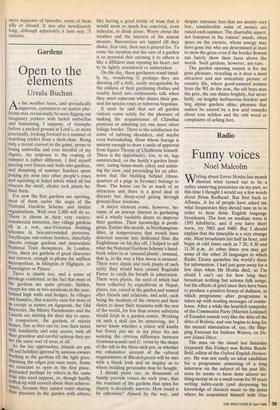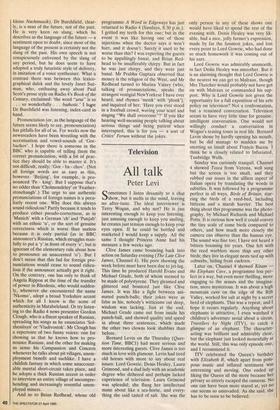Radio
Funny voices
Noel. Malcolm
writing about Enver Hoxha last month showed what turned out to be a rather unnerving prescience on my part, so this time I thought I would say a few words about Brian Redhead. But first back to Albania. A lot of people have asked me what frequencies they should tune in to in order to hear these English language broadcasts. The best on medium wave is 1395 kiloHertz; and if you have short wave, try 7065 and 9480. But I should explain that the timetable is a very strange one. Most broadcasts last half an hour, and begin at odd times such as 7.30, 9.30 and 11.30 p.m. At other times you may get some of the other 20 languages in which Radio Tirana quenches the world's thirst for information. I had just gone away for a few days when Mr Hoxha died, so I'm afraid I can't say for how long they broadcast nothing but solemn folk songs; but the effects of grief since then have been to produce a positive frenzy of dullness, in which programme after programme is taken up with reading messages of condo- lence. After a while the heartfelt sympathy of the Communist Party (Marxist-Leninist) of Ecuador sounds very like the ditto of the ditto of Bolivia, and one begins to long for the mental stimulation of, say, the Ship- ping Forecast for Inshore Waters, or De- sert Island Discs.
The man on the island last Saturday (repeated this Friday) was Robin Burch-
field, editor of the Oxford English Diction- ary. He was not really an ideal candidate for a programme consisting of a long
interview on the subject of his past life, since he seems to have done almost no- thing except sit in a small room for 30 years
writing index-cards .(and deepening his knowledge of classical music to the point where he acquainted himself with Eine kleine Nachtmusik). Dr Burchfield, clear- ly, is a man of the future, not of the past. He is very keen on slang, which he describes as the language of the future — a sentiment open to doubt, since most of the language of the present is certainly not the slang of the past. His own speech is not conspicuously enlivened by the slang of any period, but he does seem to have adopted a truly futuristic style of delivery, in imitation of a voice synthesiser. What a contrast there was between this lexico- graphical dalek and the lovely Janet Suz- man, who, enthusing away about Paul Scott's prose style on Radio 4's Book of the Century, exclaimed: 'the word "arse" is so . . . so wonderfully . . . bathotic.' I hgpe Dr Burchfield was listening, index-card in hand.
Pronunciation (or, as the language of the future seems likely to say, pronounciation) has pitfalls for all of us. For weeks now the newsreaders have been wrestling with the accentuation and vowel-sounds of `Gor- bachov% I hope there is someone in the BBC who is capable of telling them the correct pronunciation; with a bit of prac- tice they should be able to master it. It's not difficult, really: `Gor - ba - chov'. (Not all foreign words are as easy as this, however. 'Beijing', for example, is pro- nounced 'Pe - king'. But I suppose that's no odder than `Cholmondeley' or 'Feather- stonehaugh'.) The urge to use authentic pronunciations of foreign names is a pecu- liarly recent one. Why does this always sound ridiculous? Partly because it tends to produce either pseudo-correctness, as in `Munich' with a German 'eh' and 'Punjab' with an ethnic `u', or the sort of genuine correctness which is worse than useless because it is only partial (as in BBC announcer's Russian, which struggles man- fully to put a 'y' in front of every `e', but is ignorant of the elementary rule about how to pronounce an unaccented 'o'). But I don't mean that this fad for foreign pro- nunciations would cease to sound ridicu- lous if the announcer actually got it right. On the contrary, one has only to think of Angela Rippon at the time of the transfer of power in Rhodesia, who would sudden- ly, whenever she encountered the name 'Nkomo', adopt a broad Yorkshire accent which for all I know is the acme of authenticity in Matabeleland. Or try listen- ing to the Radio 4 news presenter Gordon Clough, who is a fluent speaker of Russian, spreading his wings as he enunciates 'Sol- zhenitsyn' or 'Vladivostok'. Mr Clough has a repertoire of two funny voices: one for showing us that he knows how to pro- nounce Russian, and the other for making us sense his Compassion and Concern whenever he talks about pit villages, unem- ployment benefit and suchlike. I have a childish fantasy in which some unaccount- able mental short-circuit takes place, and he adopts a thick Russian accent in order to interview an entire village of uncompre- hending and increasingly resentful unem- ployed miners.
And so to Brian Redhead, whose old
programme A Word in Edgeways has just returned to Radio 4 (Sundays, 8.30 p.m.). I gritted my teeth for this one; but in the event it was like having one of those injections when the doctor says it won't hurt, and it doesn't. Surely it used to be worse than this? I was expecting the guests to be appallingly banal, and Brian Red- head to be insufferably chirpy. But in fact he was just chirpy, and they were just banal. Mr Prabhu Guptara observed that money is the religion of the West, and Mr Redhead turned to Marina Vaizey (who, talking of pronunciations, speaks the strangest vestigial NewYorkese I have ever heard, and rhymes 'monk' with 'plonle), and inquired of her: 'Have you ever stood in a football crowd, waving your scarf and singing "We shall overcome"?' If you like hearing well-meaning people talking about serious things and being patient when interrupted, this is for you — a sort of Critics' Forum without the jokes.



















































 Previous page
Previous page